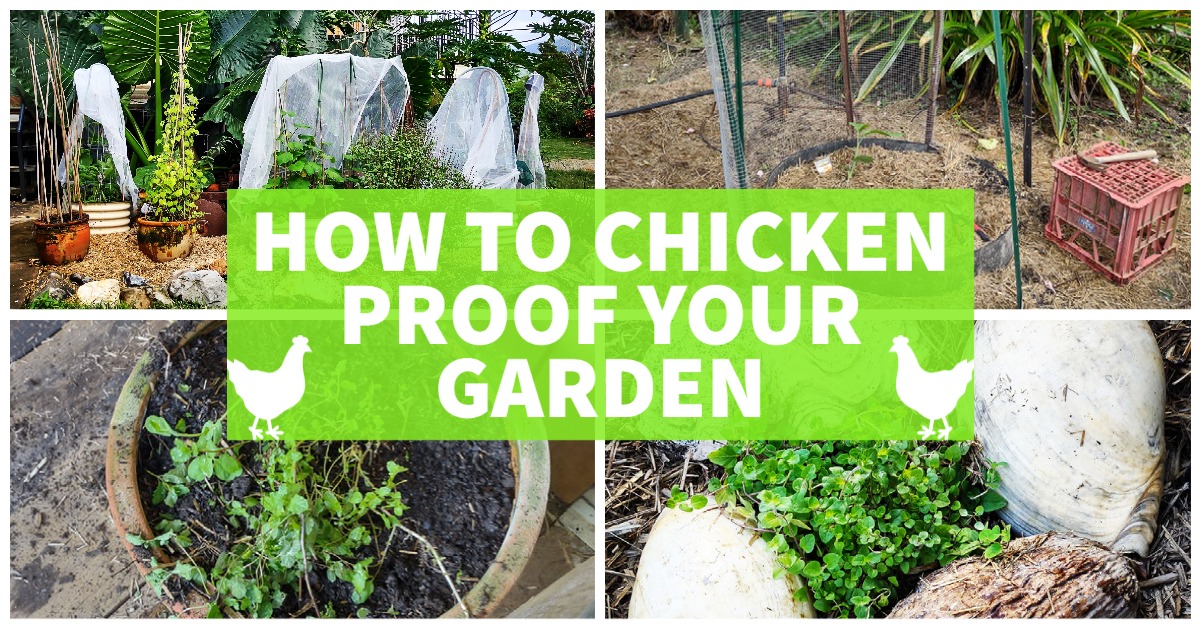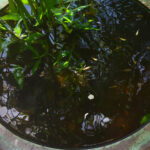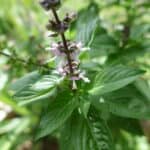This post may contain affiliate links.
If you have chickens free-ranging in your garden, on your property, homestead or back yard, you’ll need to chicken proof your garden, pots, raised beds, and vegetables. These are the chicken-proofing ideas and designs that have worked for us in our garden over several years of keeping chickens in a garden or homestead, in suburbia or a rural setting. We also talk about plants that chickens do and don’t eat that are safe to plant around chickens.

These will also work for keeping your neighbour’s chickens away from your plants! Chickens can and will destroy a garden, be in no doubt about that!
Chicken Proof Garden

Free range chickens get into everything and will want to eat your plants and scratch them up. Chickens can also jump upwards quite high to reach food overhead, so placing food crops above your chickens’ reach may not help.
Chickens can, of course, fly, not so much vertically, so a high fence around your garden may solve your problem.
If you don’t want to fence-off your garden bed areas, or if you have food plants scattered around your land, food-forest style, as we do, you’ll need to take steps to chicken-proof your plants.
Dangers of Chickens In Your Garden


Chickens destroy your garden plants and garden beds in four main ways and can be very destructive in a garden setting.
- Chickens scratch in the dirt digging up seeds and seedlings and disturbing roots.
- As your chickens scratch, they will destroy and relocate your mulch and any sewn seeds.
- Chickens can pull up young plants.
- Chickens will eat your plants, leaves, and roots
Benefits of Chickens in Your Garden
Chickens are a wonderful bird to keep, giving you fun, friendship, food, some pest control, and an extra source of added fertiliser for your garden.
If you’re looking for serious pest control, guinea fowl should be your go-to bird. These noisy birds are also less likely to destroy your plants, preferring a diet of bugs. But this post is about chickens.
We also keep geese free-ranging in our garden and they have caused no garden destruction at all, other than being messy. Geese eat grass, particularly grass seeds, so hopefully they’re helping our weed control.
Chickens, in contrast, are destructive.
- Chickens are adorable
- Chickens are fairly easy to keep
- Each chicken will likely give you 2 eggs per day
- They can turn weeds and scraps into manure
- Their used bedding can make great compost
- They eat some bugs
- They add to your ecosystem
Chicken Proof Garden Ideas

Young plants and seedlings are particularly vulnerable to chicken attack. As are smaller plants whose roots aren’t deep and firmly established. The plants that chickens find tasty are also at risk. Chickens can strip a kale plant of leaves in moments.
Chickens will also jump up into large pots or raised beds to dig and scratch. Plants in pots will need similar chicken protection.
Once a plant is large, strong and woody, it is far more likely to survive your chickens. Young plants are most vulnerable and will need chicken protection.
Here are some ideas to stop chickens from destroying your plants.
- Protect young plants from being scratched up with solid objects around their base.
- Cover new plants in a chicken-proof box or cage that allows light and water in.
- Use chicken wire, bird netting, wood fencing, or aviary wire (hardware cloth) to cage vulnerable plants.
- Use hardy ground cover to prevent scratching, for instance, pineapples.
- Use heavy objects, like rocks, around young plants.
- Grow abundant food and cover for chickens in a chicken-safe zone away from your prized garden beds.
- Keep fewer chickens and feed them well.
- Cage your chickens
- Cage your garden.
Are Geese as Destructive as Chickens in the Garden?
In our experience no, geese do not destroy your fruit, veg, and garden beds in the same way that chickens can, this is mostly because they don’t scratch in the same way that chickens do. Geese eat grass, and are particularly fond of grass seeds it seems. They may help you keep your weeds down. Beware geese in a muddy situation, they will make mud and puddles worse. They also have very big feet and will crush seedlings.
Are Guinea Fowl Less Destructive That Chickens in The Garden?
Guinea fowl are very useful in the garden or on the farm or homestead, in eating bugs and pests. They are particularly good at eating ticks and some people keep them purely for tick control. We’ve had no issues with guinea fowl getting into garden beds or food crops.
Will Chickens Jump Up into Raised Beds?
Yes, absolutely, depending on the height. A combination of a jump and a flap will get your chickens into any raised bed. Luckily, raised beds, being so compact, are easy to protect from chickens by building a cage or net with poles, old hosepipe, bird netting or chicken wire and aviary mesh (landscaping cloth). If you use bird netting choose one that birds and bats cannot be entangled in.
Covering a low pot or raised bed with chicken wire may not work because the holes in chicken wire are often big enough for the birds to get their heads in, and they can get to the plants in your raised bed.
Plants Chickens Won’t Destroy
Plants that our chickens haven’t been able to destroy, or maybe don’t like the taste of, include:
- Papayas, because the fruit and leaves are too high for them to reach and they can’t fly up to the plant and perch. However, chickens do love to eat papaya. Bats and parrots are more likely to destroy your papaya harvest still on the plant.
- Pineapples, Spiky pineapple plants repel chickens. We don’t know for sure yet if they will try to eat ripe pineapples growing on the plant, but spiky plants like pineapples stop chickens from scratching and can be planted around vulnerable young plants.
- Lemongrass. Lemongrass is tough and our chickens don’t touch it. They may scratch up very young plants.
- Citrus fruit, our grapefruit trees, lemon trees and orange trees are safe from chickens. The birds won’t even peck at fallen fruit.
- Longevity spinach. This tropical spinach seems to have zero chicken appeal.
- Oregano, likewise, chickens don’t eat the oregano, they can scratch it up though.
- Thai basil, chickens don’t seem to like eating this tropical herb.
You may think your hot chilli peppers are safe from chicken attack, but no, chickens will pull the peppers, even when still green, off the chilli plants destroying your chilli harvest. You’ll need to protect them. Some species of birds do eat even super hot chillies and a flock can strip a plant.
Chickens also like to peck at pumpkins and will eat some strong-smelling herbs, such as mint.








